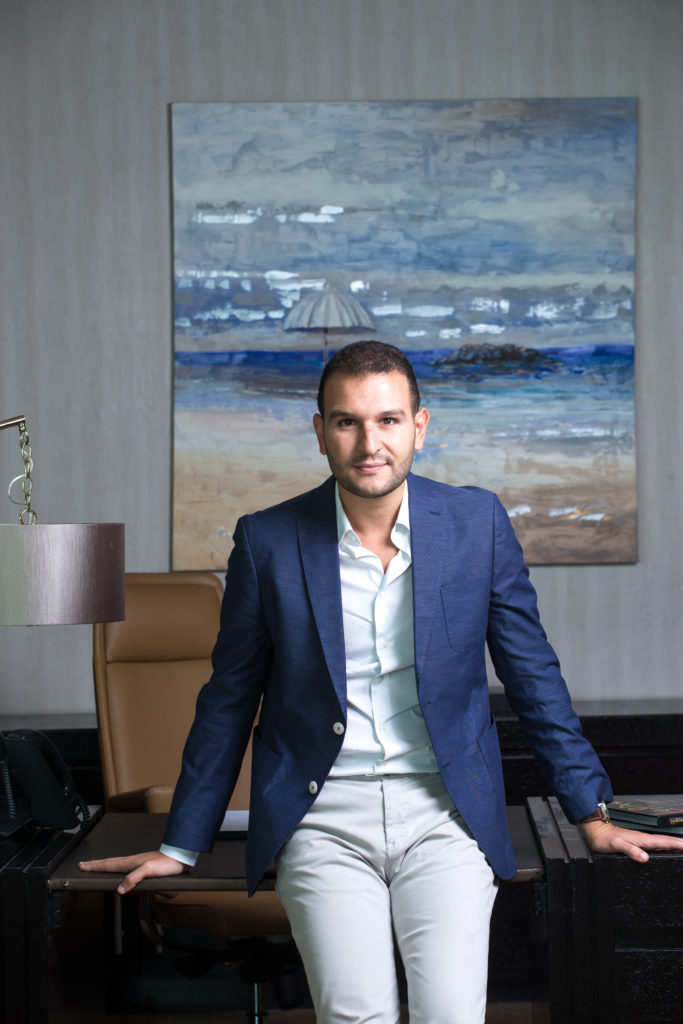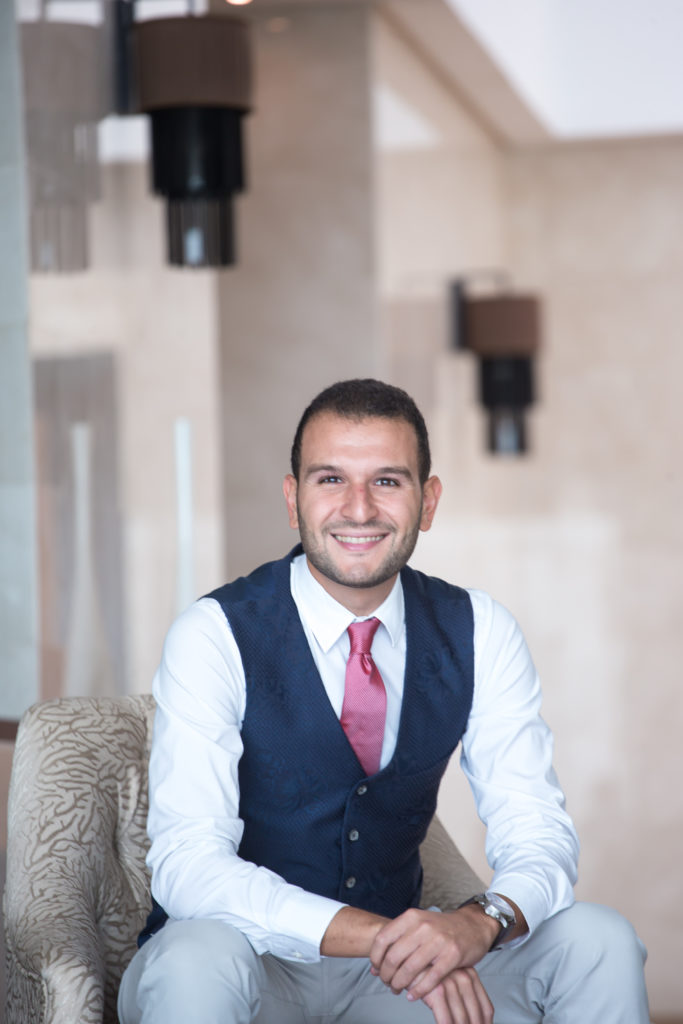The beauty of a family-owned business is how everyone shares the same beliefs, ethos, and carries the legacy forward. Personal bonds result in strong commitment, and loyalty that gives a competitive edge over others. Mirodec Gulf is all about this and much more. This Lebanon-based glass manufacturer has grown from strength to
strength with each passing generation. Michael Khoury, general manager of Mirodec Gulf, beamingly says: “We take pride in being a family business in its third generation. The journey of this family business started in Lebanon in the 1950s when my grandfather laid the foundation of a small workshop that catered to basic glass and mirror Standing
the test of time requirements. In 1982, my father, strategically decided that the company should shift its focus
to the creation of bespoke decorative glass and accordingly it was re-branded as Mirodec” (which abbreviates the words ‘Mirror’ and ‘Decoration’).”
From early foundation years to creating outstanding products, providing dedicated customer service, as well as generating innovative ideas, Mirodec has come a long way. Khoury continues: “In the past 40+ years, our firm has
completed thousands of projects; most of which have been logged as case studies for future reference and development. Accordingly, our competitive advantage is definitely the extensive “know-how” which has been fully passed on from generation to generation.”
After delivering a series of successful projects in Lebanon, the company decided to venture out and explore the booming market in the UAE. Khoury shares: “In the late 2000s, what started out as a dissertation for a Master’s degree quickly turned into what is known today as ‘Mirodec Gulf’. Due to Dubai becoming a central hub for design as
well as luxury projects in the region, the company gained great exposure to upcoming projects and cemented itself as the leader in its niche.”

From 7-star hotels and presidential palaces to high-end residential villas, and retails shops, Mirodec’s diverse portfolio spans across major sectors including hospitality, residential, commercial, F&B, and governmental projects.
Some of the successful commissions include Emirates Palace Abu Dhabi, Dubai Metro (developed with KCA International), Cleveland Clinics Abu Dhabi (developed with Aedas), Presidential Palace Abu Dhabi (Qasr Al Watan)
which was developed with Xavier Cartron Paris and Wilson Associates. Mirodec is also working with numerous
designers on the many different pavilions for Expo 2020 that will constitute the main area of the event.
Each pavilion will represent a different country or theme and accordingly has its own unique design. Khoury feels that due to the economic landscape in the region and the volume of projects, everything has become cost-driven
and this has led to a lot of value engineering. In Lebanon on the other hand, and due to the smaller scale of the projects, value engineering is not as prevalent. It is worthy to note though, that the pace of projects is much faster in Dubai as the city is constantly growing. Khoury tells: “For example and as previously mentioned, ever since the city
was awarded the hosting privilege of Expo 2020, we have been working on various pavilions which must be completed by mid 2020 and accordingly we are expecting a busy and exciting year ahead.”
Khoury knows it’s a dynamic industry where everyone wants to gain market share. This is where the family values and learnings passed on to the younger generation are considered integral. Mirodec’s core strength lies in the unity of its third generation, represented by Khoury and his two siblings, both of which are also involved in the business in Lebanon and the UAE. All three unanimously agree that the ongoing guidance and experience provided by the second generation, represented by their father, is considered no less than a treasure.
The best advice Khoury has received is— ‘Nothing is constant but change’ and he credits this for all the success Mirodec has achieved so far. “Our greatest success in the business has been adapting to the changing industry while maintaining constant year-on-year growth. In the past five years in the UAE, our industry has unfortunately
witnessed eight competitors close down due to the inability to keep up with the ever-changing dynamics.
Manufacturing and contracting are industries with high overheads. Companies cannot become complacent because failure to quickly adapt will almost certainly result in a catastrophic outcome,” claims Khoury.
A business faces a range of challenges, which have to be overcome. Since Mirodec manufactures bespoke products, the most common fault contractors tend to make is obtaining quotations from the market and assuming that they can safely compare them using the “apple to apple” method. While this might apply to basic items, it does not apply to most decorative ones.
Khoury adds: “Major differences in estimation can arise due to the different source of material, the techniques used and their relative workmanship, as well as the method of installation proposed. Our first major challenge is to convince the contractor that we have been specified by the consultant for a reason. The second is to convince them that the price difference is justified.”
Khoury knows how to deal with the pain points and challenges that come along in the business. He says: “One of our favourite quotes states that ‘The bitterness of poor quality remains long after the sweetness of low price is forgotten’. We generally avoid price wars and instead focus on giving our clients the best value for their money. Our USP is quality and unmatchable service. Our clientele includes companies who are willing to pay that slight premium and ensure that their projects will be delivered on time and that their inspections will be approved by the consultant. Internally, quality is still the forefront of everything we do. We only hire those with strong skill-sets and ensure that our salaries are above the market standard to reward this fact. We offer progressive training for all our staff, striving to constantly improve their professional development. In turn, we boast a solid zero incident rate.”
From classic hand-made pieces assembled by skilled artists to modern panels created using the latest technologies, Mirodec offers the full range of techniques possible in the world of decorative glass and mirrors. Glass can be
used limitlessly in interiors; from floorings to ceilings passing through the staircase (such as the renowned Apple Floating Staircase). Due to hygiene and ease of maintenance, hospitals have all their walls cladded with back-painted glass. Due to the ability to control the material from being transparent to translucent to Opaque,
partitions are most commonly done in glass. In furniture, a designer can develop glass tables and benches as well as customised bowls and plates which are common for the retail and hospitality industries. With the ability to print on glass, some designers are even replacing traditional paintings with high-resolution UV printed glass.
Khoury says: “Laminating decorative interlayers in between two glass panels is definitely a technique, which has been constantly on the rise. Although it is not a new technique, we have managed to develop it in a way designers have embraced. We have developed partnerships with world-renowned brands that produce fabrics and metal mesh, which we laminate seamlessly in glass, providing the end-user with a durable and easy to maintain high-end decorative product. Also, instead of beveling the edges of glass or mirrors, another trending technique is V-grooving the face of the panel which gives a special 3D effect.”
“In line with showcasing the numerous possibilities available in the field of glass, we were proud to display our work at the latest Dubai Downtown Design exhibition. Our “Glass Forest” concept, designed in collaboration with the
renowned Xavier Cartron, was well-received and proved a major success in highlighting the vast versatility of glass as an element utilised in interior design,” shares Khoury.
There is a lot one can do using glass and mirrors and the knowledge needs to be spread. Designers who understand its potential ultimately utilise their talent to develop it in the most beautiful ways. Mirodec helps designers reach that stage. “Amongst our customers are interior design firms and freelance designers. Although this is a “nonpaying” category, we believe it is crucial to help them understand the versatility of the product and its limitations. A designer works with several different materials and should not be expected to know all the particulars. As a specialist in glass, Mirodec is proud to service most interior design companies in the UAE by providing them
customised samples and helping them write down precise project specifications,” says Khoury.
Khoury further adds: “Another category of customers includes contractors and fit-out specialists. While it is common for most contractors to seek the lowest priced supplier, we tend to work with the more experienced ones who are aware of the risks of going down that route.”

Historically, end-users used to be the smallest category in business for Mirodec, yet in the last few years, this trend has changed drastically. “There’s a sharp increase in the business generated by the end-users. In general, people today are more aware of design. With the presence of apps such as Pinterest, anyone can access a pool of ideas and decide what they would like to implement in their homes. When people walk into ‘Qasr Al Watan’ in
Abu Dhabi and realise that the main feature domes and skylights were manufactured locally, they take
notice. The common reasoning for villa owners in the UAE has now become ‘Why go to Italy to manufacture my double curved skylight when I can easily visit and inspect the facility, and fully customise the product to my own liking?’.”
Khoury has some solid plans for the future and is working towards it. Mirodec is currently, completing the plans of building a new work plant, which can accommodate the growing demand for both glass and metal divisions.
Khoury says: “To help showcase the vast number of techniques achievable in the industry, this new establishment will also have the biggest decorative glass showroom in the UAE. Also, before the end of the year, we are scheduled to go live with our new online catalogue, which will assist designers in accessing our wide range of products. In
conjunction, we will be launching our new cloudbased ERP which will allow our customers to request their samples and quotations directly from our website. We are also in the early stages of discussing a potential partnership with one of our key clients in KSA. They are keen to bring the brand under their umbrella and we are excited at
the prospect of having a full-time presence in this growing market.”
The third generation is certainly carrying on the family legacy forward and ensuring enhanced growth and continued success. More power to you!

